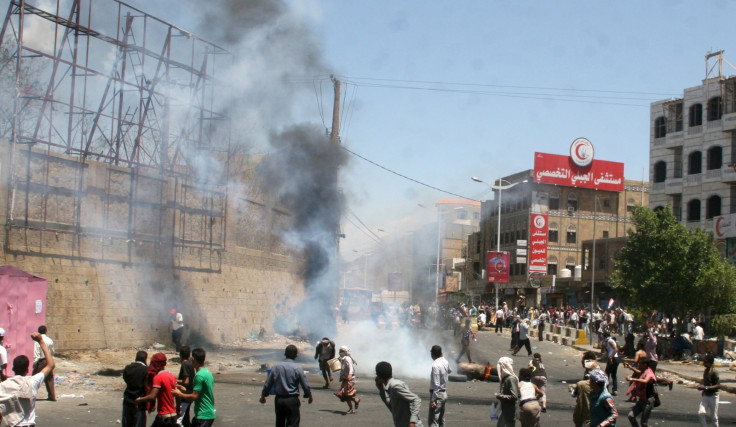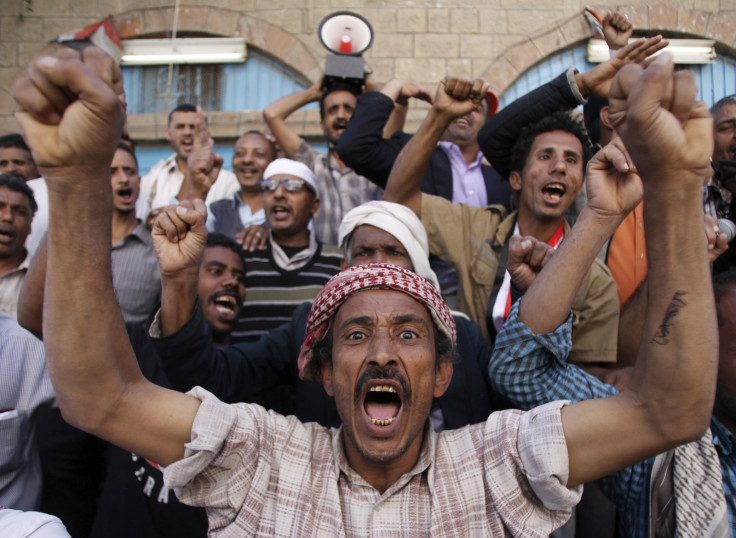Yemen Houthi crisis: Taiz mass protests show rebels are facing their first major test

Against a backdrop of charred rubber tyres and dark smoke billowing, two young men pumped their fists in the air. This was a sign they would not put up with the Houthi invasion of their city, Taiz.
Wednesday (25 March) was the third day of protests, during which tens of thousands of intrepid women, children and young professionals thronged the streets calling for the Houthi militia to leave them alone.
During the protests, which began peacefully, between six and nine people have been killed and more than 80 injured. Taiz Medical Association have called upon doctors and health professionals to assist at other hospitals including Ibn Sina, Alhamd and Aldawli, blighted by the rising injuries and shortage of health professionals on the ground. Alguneid said the rebels were also targeting medical crews and ambulances.
Yet the protesters are undaunted.
During Wednesday's protests, some activists touched their foreheads to the ground and continued to pray, oblivious to the gunfire, bloodshed and chaos. Roads were cordoned off to prevent access to the rebels.
'The degree to which the Houthis are being funded by Iran is unclear, although most Yemen watchers believe Tehran is funnelling both weapons and military advice to the rebels. Just like its backing of Lebanese militia group Hezbollah, the Houthis make an excellent proxy on the border of Iran's most significant ideological and geopolitical enemy, Saudi Arabia.'
IBT's executive editor Orlando Crowcroft asks: 'Who are the Houthis?' Read here.
Despite the mass opposition, the Houthis have already captured several state facilities in the city, including Taiz International Airport on Sunday, and forced provincial governor Shawki Ahmed Hayel to resign. Activists and Taiz residents present at the protest aren't surprised by the Houthi advance into Yemen's third-largest city.
Fernando Carvajal, a US-based Yemen analyst who spent several years in the country, said Taiz is the most vital strategic prize for Houthis and the country's former president, Ali Abdullah Saleh. Once a military force enters Taiz from Dhamar, it has no topographical obstacles to move south toward Aden.
"It is not only symbolic as the 'center of the youth revolution' of 2011 but it is a province with access to the Red Sea. Besides it also has a large airport for the air force, the road leads to five southern provinces and from the mountains of Turbah, direct missiles can reach the city of Aden," Carvajal said.
Taiz, which usually prides itself on educated people, professionals and traders, was at the heart of the revolution in 2011 which toppled Saleh. With little tribal influence, the people of Taiz have always resisted the militias' putschist tactics, and now they are attempting to do the same.
'Saleh's dance'
As the protests raged on Wednesday, tens of thousands of angry protesters marched to the Taiz governorate office on Camp street, demanding the Houthis withdraw. The march followed the resignation of Hayel, who was unable to quell the tensions, with half the army supporting the rebels and the remaining half with the former president Saleh.
A disgusted physician and activist, Abdulkader Alguneid, said: "Houthis have been inserted into the Special Forces by Saleh to hurt Taiz and to do the dirty work, but were prevented from joining Brigade 22, for a reason that will be evident later. It's one of Saleh's dances."

Alguneid added that today people in Taiz are infuriated, but are equally full of resolve to carry on until they accomplish their goals.
Indeed, despite the gunfire and teargas used by the Houthis to disperse the crowds, thousands of protesters havestayed put to protest. They continue to chant loudly, carrying banners with messages such as "Resign only when you choose."
Akram Al Jubaihi, studying media studies at Taiz University, said: "We will go out into the streets and fight the militia, even if they want to kill us."
'We beat Saleh - and we will prevail again'
The Houthis have attempted to play down the demonstrations. Hussain Al Bokhaiti, a member of the rebels' Political Office, insisted they are not facing huge opposition in Taiz.
"People in Taiz are not hostile to militia, in fact there are many tribes that are loyal to Ansar Allah [an alternative name for the group]," Bokhaiti insisted, adding the protests became violent as a result of aggression by supporters of Islamist party Al-Islah party, and others who attacked the Houthi Political office in Taiz.
"Obviously, if they are going to attack us we have to defend ourselves," Bokhaiti said.
Yet analyst Fernando Carvajal is not impressed. He warned that Taiz will be the first major test for Houthis and Saleh, suggesting will be easy to take control of the city, now that the Governor has resigned, but it will not be easy to actually administer and secure over time.
Ahmed Saeed Al Wafi, a 30-year-old human rights activist brimming with optimism, said widespread non-violent protests eventually forced Saleh to step down in 2011, and the same could happen again.
"Saleh was stronger, and with twice the power, but we made sure he fell" Al-Wafi said, adding that he is keen to repeat this again and return the Shia rebels to the Marran mountains in Saada [the Houthis' stronghold].
© Copyright IBTimes 2025. All rights reserved.





















